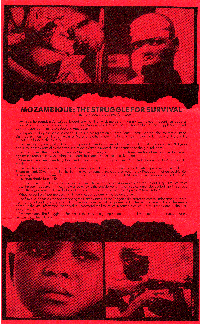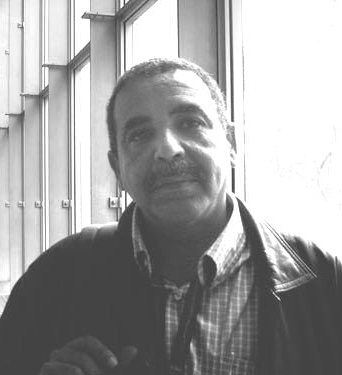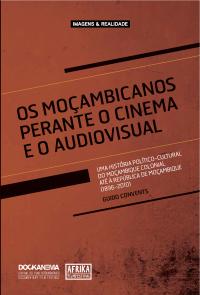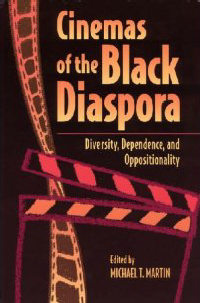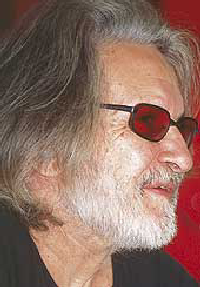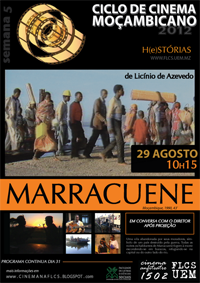Mozambican Film and Cinema, 1976-1991
Dossier MZ-0115
![]()
The introductory text to this page has been temporarily taken down for editorial reasons. It contained several inaccuracies and disputed interpretations about the early history of the Instituto Nacional de Cinema. These errors were kindly drawn to the attention of MHN by participants in that history. In addition, Guido Convents’ book on cinema in Mozambique (see left for the cover and a link) is now available. A new and hopefully more accurate introductory text based on the information received from the participants, plus the account in Convents' book will be posted shortly. MHN apologises for any inconvenience to users.
Mozambique History Net
15 November 2014
Links to Resources
◊ April 1983
Clyde Taylor. ‘Interview with Pedro Pimente [sic]: film reborn in Mozambique,’ Jump Cut no.28 (April 1983) pages 30-31. Click here to see an HTML version of the interview.
Films produced in independent Mozambique were first shown the United States at the end of 1981, accompanied by lectures and dialogues from Pedro Pimenta, assistant director of the Mozambique Film Institute, and Camilo de Sousa, a Mozambican filmmaker. This interview was recorded during the tour in the San Francisco Bay Area.
Clip from Tempo dos Leopardos (Zdravko Velimirović, 1985)
◊ Autumn 1995
Claire Andrade-Watkins. ‘Portuguese African cinema: historical and contemporary perspectives: 1969 to 1993,’ Research in African Literatures vol.26 no.3 (Autumn 1995), pages 134-150. Click here to download a PDF [requires subscription to JSTOR].
Films from Mozambique and Angola comprise an important chapter in the history of African cinema. The period of liberation cinema begins in 1969, and this article examines its subsequent development in Mozambique during the 1960s and 1970s in the context of film production in sub-Saharan Africa. The study concludes with the transition in Mozambique in the late 1980s from state to private sector production and international co-productions. Contemporary cinema in Cape Verde, Angola, and Guinea-Bissau is also discussed.
◊ Autumn 2001
Marissa Moorman. ‘Of Westerns, women, and war: re-situating Angolan cinema and the nation,’ Research in African Literatures vol.32 no.3 (Autumn, 2001), pages 103-122. Click here to download a PDF [requires subscription to JSTOR].
The contrast between Mozambican cinema history and that of Angola is stark. No films were produced in Angola from the late 1980s onwards until well into the 21st century. Cinemas in Luanda became squats for refugees, conference centres or restaurants, and video clubs replaced them, ‘signaling the national crisis in a retreat from the symbolic gathering of the nation in cinemas’. Moorman argues that it therefore becomes necessary, in a post-colonial problematic. ‘to analyse the relationship between film, cinema, and the nation’. The crisis, she concludes, ‘is not just reflected in the condition of cinema but is made there’.
Clip from A Guerra de Água (documentary; Licínio Azevedo, 1996)
◊ 2009
Ros Gray. An archive of aspirations, 2009. Click here to access a PDF file of this essay on Mozambican revolutionary film. Gray «is a writer and theorist. She is Lecturer in Critical Studies in the Department of Art, Goldsmiths College, University of London, and Tutor for Research in the Department of Curating Contemporary Art, Royal College of Art. Her interests are in revolutionary cinema and its global filmmaking networks; the screen as site of radical gathering; postcolonial and political theory; urban cultures and spatial theory; contemporary film and video art».
◊ January 2011
Margaret Dickinson. An editor in Mozambique. Third Text vol.25 no.1 (January 2011), pages 135–136. Click here to download a PDF file [requires subscription]. The piece was written ca.1979 for the British journal Film and Television Technician; to access Dickinson’s accompanying article in the same journal, ‘Flashbacks from a continuing struggle’, which explains the circumstances, click here [also requires subscription]. From the introduction to this special issue, by Kodwo Eshun and Ros Gray: «One of the many foreign film-makers who demonstrated a sustained commitment to Mozambique was Margaret Dickinson, who made the documentary Behind the Lines (1971) about FRELIMO’s armed struggle. After independence, Dickinson worked at the Instituto Nacional de Cinema (INC), which was set up in 1975. Dickinson’s article on her experience of training film-makers in 1976 is reprinted here with an introductory essay that contextualises her dedication to decolonisation in relation to the contexts of British ciné-politics and the anti-apartheid movement. By the time of independence, the majority of Mozambicans had no prior experience of the moving image, but cinema was recognised as having a key role in the formation of a national identity constituted during the armed struggle. The INC’s mission was thus ‘to deliver to the people an image of the people’».
◊ Cinema Blog
«Cinema na Faculdade de Letras e Ciências». This blog from the Universidade Eduardo Mondlane is not limited to Mozambican cinema but nonetheless includes many colour images and other useful information about events such as public lectures, film showings and so on. Click here for information about the third Ciclo de Cinema Moçambicano held by Cinema na FLCS.
![]()
MHN Resources
It may be worth pointing out that extensive local coverage of the INC’s activities and other aspects of Mozambican cinema – especially in the weekly magazine Tempo – appears not to have been available to at least some of the commentators and researchers cited above. Some of this material is listed below in chronological order, with links to PDF files; it includes interviews, news reports and reviews.
◊ 16 August 1973
[Untitled news report; USAF tries to obtain film]. Zambia Daily Mail [Lusaka], 16 August 1973. Recycles an item from the Daily News [Dar es Salaam] (15 August 1973), reporting that the US Air Force tried to obtain a copy of a film made by Robert van Lierop in the Frelimo liberated zones, for use in a counter-insurgency course. Click here to view or download a PDF, size 21 kb.
◊ 29 September 1974
Deixam-me ao menos subir às palmeiras: novas perspectivas para o cinema moçambicano. Tempo [Lourenço Marques], no.209, 29 September 1974, unpaginated. Short article on the filming by Lopes Barbosa of the Luís Bernardo Honwana story ‘Dina’ from the collection Nós matamos o cão tinhoso. The dialogue in the film is in Shangaan (shiTsonga). Click here to view or download a PDF, size 480 kb.
◊ 5 June 1977
Sobre o cinema de mobilização: entrevista com Robert van Lierop. Tempo [Maputo], no.348, 5 June 1977, p.28-31. PDF not yet available.
◊ 2 October 1977
Esther Diatta. 25. Tempo [Maputo], no.365, 2 October 1977, p.50-53. The film «25» was an early INC production, directed by Brazilian film-makers José Celso and Celso Luccas; it premiered in Mozambique in February 1977, and was later shown at Cannes, in São Paulo and on French television. This article is taken from a Brazilian periodical, Versus. Click here to view or download a PDF, size 978 kb.
◊ 12 November 1979
Dominique Terres. Écrans. Mozambique: communiquer en Super 8. Afrique-Asie [Paris], no.200, 12 November 1979, p.59. A discussion of the virtues of the Super-8 format, controversially favoured by Jean Rouch in the 1970s. Click here to view or download a PDF, size 221 kb.
◊ 3 August 1980
Sol Carvalho. Mueda é o respeito pela realidade histórica: Rui Guerra em entrevista à «Tempo». Tempo [Maputo], no.512, 3 August 1980, p.49-53. Guerra talks about his film on the Mueda massacre and his work at the INC. Click here to view or download a PDF, size 1.9 Mb.
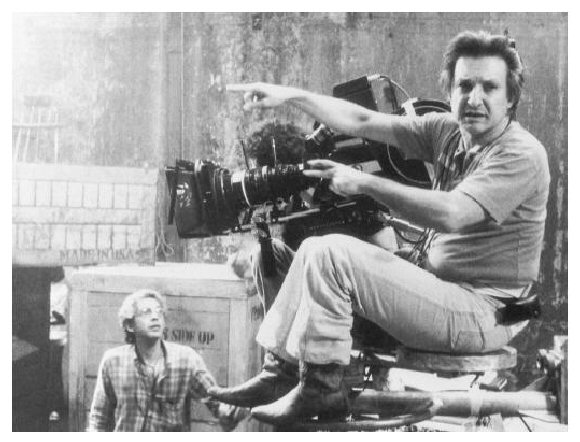
Above: Rui Guerra on set in 1970, before coming to Mozambique. Production not identified.
◊ 15 March 1981
Operação Leopardo: do soldado ao filme. Tempo [Maputo], no.544, 15 March 1981, p.48-49. PDF not yet available.
◊ 24 May 1981
Música, Moçambique: novo filme sobre 1.º Festival de Música e Canção Tradicionais. Tempo [Maputo], no.554, 24 May 1981, p.7. A short report on a conversation with the Angolan-born director José Fonseca e Costa (1933- ) about his new film on musical forms in Mozambique. Click here to view or download a PDF, size 165 kb.
◊ 14 June 1981
Alves Gomes. Kuxa-kanema: uma surpresa agradável. Tempo [Maputo], no.557, 14 June 1981, p.60-61. Alves Gomes is pleasantly surprised that the INC has the technical capacity to produce a «jornal cinematográfico com a regularidade semanal», even though there are «inúmeras falhas, muitas brechas, muitos pedaços de fita mal filmados». Click here to view or download a PDF, size 723 kb.
◊ 28 June 1981
Sol Carvalho. José Cardoso: uma história igual às outras. Tempo [Maputo], no.558, 28 June 1981, p.56-61. PDF not yet available.
◊ 4 July 1981
Francisco Belard. Cinema: cooperação com Moçambique. Expresso [Lisbon], 4 July 1981. Click here to view or download a PDF, size 146 kb.
◊ 12 July 1981
Augusto Casimiro. Música Moçambique - o filme só pode estar politicamente certo porque o acontecimento politicamente estava certo: conversa informal com José Fonseca e Costa. Tempo [Maputo], no.561, 12 July 1981, p.48-53. PDF not yet available.
◊ 18 October 1981
Realizadores do INC. Kuxa-Kanema: «somos um órgão da informação». Tempo [Maputo], no.575, 18 October 1981, p.48-49. A letter from INC film-makers protesting that an earlier Tempo article on mass media had ignored the newsreels Kuxa Kanema.
◊ 7 February 1982
Guilherme Afonso. Produção do INC ganha regularidade. Domingo [Maputo], 7 February 1982, p.12-13. PDF not yet available.
◊ 17 June 1982
RPM-URSS, co-produção de documentário: cineastas soviéticos amanhã na capital. Notícias [Maputo], 17 June 1982. Click here to view or download a PDF, size 137 kb.
◊ 24 June 1982
Comemorações da independência: cinema moçambicano em retrospectiva. Notícias [Maputo], 24 June 1982. Click here to view or download a PDF, size 79 kb.
◊ 3 August 1982
Cines-clubes vão nascer: na capital, amigos do cinema promovem debate no dia sete. Notícias [Maputo], 3 August 1982. Click here to view or download a PDF, size 150 kb.
◊ 3 August 1982
Um grande amigo de Moçambique morreu. Notícias [Maputo], 3 August 1982. Franco Cigarini, director of the film Dez dias com os guerrilheiros de Moçambique, dies in Italy. Click here to view or download a PDF, size 46 kb.
◊ 6 August 1982
Opinião pública: deixar o cinema para melhorar as notas, opinam alunos da Escola Secundária «Josina Machel». Notícias [Maputo], 6 August 1982. If pupils spend a lot of time watching films instead of studying, their school marks suffer, according to this public opinion survey (with a very small sample). Click here to view or download a PDF, size 189 kb.
◊ 21 August 1982
Cinematografia moçambicana distinguida na Itália: produções moçambicanas para crianças vão participar em festivais internacionais em Portugal e Checoslováquia. Notícias [Maputo], 21 August 1982. Click here to view or download a PDF, size 238 kb.
◊ 23 August 1982
Boavida Funjua. Em vistoria às salas de espectáculos, corpo de salvação pública detecta irregularidades: ordenado encerramento do Cinema Tivoli. Notícias [Maputo], 23 August 1982. A damaged clipping (some text missing) reporting that some Maputo cinemas do not meet public safety regulations, and the Tivoli has been closed down. Click here to view or download a PDF, size 196 kb.
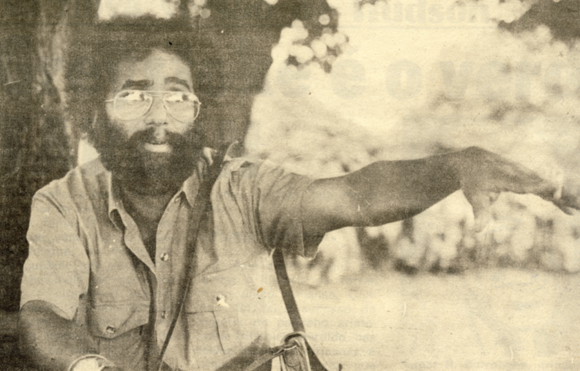
Above: The Mozambican film-maker Camilo de Sousa (b.1953). As a young man he became an exile in Belgium, and joined Frelimo's armed struggle. He worked in Cabo Delgado and established a network of "correspondentes populares" who brought film to all the districts of the province. He worked for the INC between 1980 ans 1991, and since 2001 has been associated with Ébano Multimédia as a director and producer. He was a founder member and office holder in the Associação Moçambicana de Cineastas, established em 2003.
◊ 27 August 1982
Salvaguarda de documentos da colonização portuguesa. Notícias [Maputo], 27 August 1982. Reports that over 800 films from the colonial period have been transferred from archives of the former Ministério do Ultramar and the former Agência Geral do Ultramar to the Cinemateca Nacional of Portugal. Click here to view or download a PDF, size 56 kb.
◊ 21 June 1983
Cinema moçambicano festeja 25 de Junho em Cuba. Notícias [Maputo], 21 June 1983. Click here to view or download a PDF, size 215 kb.
◊ 23 November 1983
Festival de Cinema decorre em Amiens: cinema dos países da Linha da Frente participam com destaque. Notícias [Maputo], 23 November 1983. Click here to view or download a PDF, size 57 kb.
◊ 23 November 1983
Moçambicanos conhecerão o bom cinema soviético: Eugénio Miliutin, representante da Sovexportfilm a propósito da Semana de Cinema Soviético. Notícias [Maputo], 23 November 1983. Click here to view or download a PDF, size 251 kb.
◊ 25 November 1983
Semana de Cinema Soviético: cineastas soviéticos já estão em Maputo, presente actriz de um dos filmes. Notícias [Maputo], 25 November 1983. Click here to view or download a PDF, size 130 kb.
◊ 20 December 1983
Filme sobre RPM exibido em Moscovo. Notícias [Maputo], 20 December 1983. Click here to view or download a PDF, size 86 kb.
◊ 11 January 1984
O papel do cinema na formação do homem. Notícias [Maputo], 11 January 1984. Click here to view or download a PDF, size 169 kb.
◊ 7 March 1984
Após onze meses de cursos, 30 profissionais do cinema recebem certificados. Notícias [Maputo], 7 March 1984. Training courses at the INC. Click here to view or download a PDF, size 132 kb.
◊ 20 May 1984
Exprimo-me melhor através da imagem: José Cardoso, realizador cinematográfico. Domingo [Maputo], 20 May 1984. Interview with the director José Cardoso. Click here to view or download a PDF, size 291 kb.
◊ 27 September 1984
Cinema moçambicano em festival: envento [sic] iniciou ontem em Maputo. Notícias [Maputo], 27 September 1984. The opening of the first «Festival do Cinema Moçambicano». Click here to view or download a PDF, size 43 kb.
◊ 1 October 1984
I Festival de Cinema Moçambicano: Cinema Matchedje. Notícias [Maputo], 1 October 1984, p.5. An advertisement listing the films and the show times. Click here to view or download a PDF, size 43 kb.
◊ 7 October 1984
80 filmes moçambicanos em busca de espectador. Domingo [Maputo], 7 October 1984. Click here to view or download a PDF, size 320 kb.
◊ 11 November 1984
Cinema: a novidade chama-se Maputo Mulher. Domingo [Maputo], 11 November 1984. Click here to view or download a PDF, size 119 kb.
◊ 11 November 1984
Na hora e na vez do cinema: Maputo mulher, o conflito entre o velho e o novo. Entrevista com Mário Borgneth, realizador do filme. Domingo [Maputo], 11 November 1984. An interview with the film director Mário Borgneth. Click here to view or download a PDF, size 312 kb.
◊ 7 July 1985
Augusto de Jesus. O Tempo dos Leopardos: sobretudo uma grande experiência, superior à de cinco anos numa escola de cinema – Camilo de Sousa. Domingo [Maputo], 7 July 1985. Click here to view or download a PDF, size 372 kb.
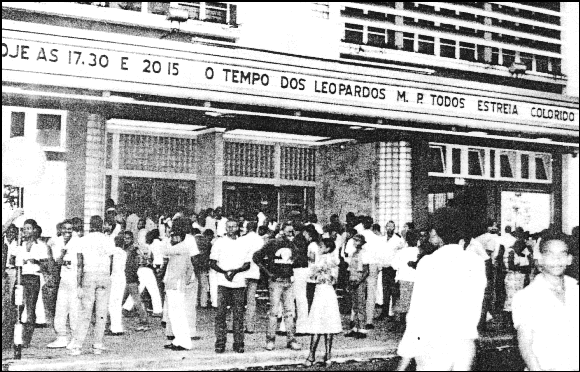
Above: Mozambican movie-goers wait outside the cinema Avenida in 1985 for the first showing of Tempo dos Leopardos.
◊ 28 July 1985
Paulo Sérgio. O Tempo dos Leopardos: um orgulho. Tempo [Maputo], no.772, 28 July 1985, p.49-51. PDF not yet available.
◊ August 1985
Etevaldo Hipólito. Maputo Mulher: um filme polémico. Cadernos do Terceiro Mundo [Rio de Janeiro], no.80, August 1985, p.88-90. Click here to view or download a PDF, size 533 kb.
◊ 7 December 1985
Brasil: primeiro prémio para Tempo dos Leopardos, filme recebe menção honrosa. Notícias [Maputo], 7 December 1985. Click here to view or download a PDF, size 37 kb.
◊ 18 May 1986
Teresa Sá Nogueira. O cinema para mostrar Moçambique: entrevista com Rodrigo Gonçalves. Tempo [Maputo], no.814, 18 May 1986. Interview with the Chilean film director Rodrigo Gonçalves, whose movies include «Pintores Moçambicanos» and «Acordo de Nkomati: o Direito de Viver em Paz». Click here to view or download a PDF, size 304 kb.
◊ 21 May 1986
Troféu de ouro para Tempo dos Leopardos. Notícias [Maputo], 21 May 1986. Click here to view or download a PDF, size 59 kb.
◊ 25 May 1986
António Makwala. Um filme que chocou a Suécia. Tempo [Maputo], no.815, 25 May 1986, p.50-51. PDF not yet available.
◊ 29 June 1986
Henrique Mano. O Vento Sopra do Norte: um filme de José Cardoso, produção do Instituto Nacional de Cinema. Tempo [Maputo], no.820, 29 June 1986, p.48-50. PDF not yet available.
◊ 17 August 1986
Teresa Sá Nogueira. Cinema moçambicano. Tempo [Maputo], no.827, 17 August 1986, p.41-45. First of a series of articles; this one is about José Cardoso. Click here to view or download a PDF, size 880 kb.
◊ 7 September 1986
Lourenço Jossias. Matar um Sonho: um filme-denúncia contra a guerra de agressão, ou a alternativa às prateleiras vazias de Maputo. Domingo [Maputo], 7 September 1986. «Matar um Sonho» was co-directed by Anders Nilsson and Gunila Akessen. Click here to view or download a PDF, size 415 kb.
◊ 7 September 1986
Teresa Sá Nogueira. Cinema moçambicano (3): Artur Torohate, cineasta guerrilheiro . Tempo [Maputo], no.830, 7 September 1986, p.44-45. Click here to view or download a PDF, size 239 kb.
◊ 21 September 1986
Teresa Sá Nogueira. Cinema moçambicano (4): Camilo de Sousa «Aqui não há cinema sobre a guerra». Tempo [Maputo], no.832, 21 September 1986, p.43-46. PDF not yet available.
◊ 19 October 1986
Teresa Sá Nogueira. Cinema moçambicano (6): cinema móvel. Tempo [Maputo], no.836, 19 October 1986, p.48-50. PDF not yet available.
◊ 23 November 1986
Teresa Sá Nogueira. Cinema moçambicano (7): Kanemo, um projecto de cinema. Tempo [Maputo], no.841, 23 November 1986, p.44-45. Click here to view or download a PDF, size 280 kb.
◊ 2 March 1987
Shehnilla Mohamed. Crisis for film on Maputo war. Herald [Harare], 2 March 1987. Notes a financial crisis surrounding the Bob and Amy Coen production in Zimbabwe of a documentary based on the book Destructive engagement by Phyllis Johnson and David Martin. The film was eventually completed as «Mozambique: the Struggle for Survival» (57 min.). See the following document for more details. Click here to view or download a PDF, size 374 kb.
◊ no date
Mozambique: the struggle for survival. Harare, New York: Video Africa, no date, 1 leaf. An undated ‘zed-fold’ flyer (21,5 x 35,5 cm.) for the Bob and Amy Coen documentary. The film is available for viewing online at Vimeo, here. Click here to view or download a PDF, size 1.1 Mb.
◊ 29 March 1987
O vento vai soprar. Domingo [Maputo], 29 March 1987. Click here to view or download a PDF, size 139 kb.
◊ 26 August 1987
Depois da capital, O Vento Sopra do Norte está em Sofala e Nampula: actores do filme opinam em declarações ao «Notícias». Notícias [Maputo], 26 August 1987. Click here to view or download a PDF, size 223 kb.
◊ 5 September 1987
O Vento Sopra do Norte: fragmento de uma realidade. Diário de Moçambique [Beira], 5 September 1987. Click here to view or download a PDF, size 182 kb.
◊ May 1988
Larry Kuehn. Mozambique: the video. Southern Africa Report [Toronto], May 1988, p.31. Review of the Bob and Amy Coen production, «Mozambique: the Struggle for Survival» (1987). Click here to view or download a PDF, size 215 kb.
◊ 29 December 1988
Pretoria’s bandits create a Chain of Tears. Guardian [London], 29 December 1988. Chain of Tears was a Toni Strasburg film. Click here to view or download a PDF, size 110 kb.
◊ no date
Films on VHS video available on loan. London: Mozambique Information Office, no date, 4 pages. A list of 30 video tapes from or about Mozambique that were available for loan from the MIO office in London in the late 1980s-early 1990s. Click here to view or download a PDF, size 267 kb.
◊ 1990
Is the devil really a child? Vienna: Extrafilm, no date, 4 pages. A colour flyer for an Austrian-produced film by Margareta Heinrich and Margit Niederhuber (97 min., 1990). PDF not yet available.
◊ 10 February 1990
Queixas. Informáfrica [Lisbon], no.12, 10 February 1990. Complaints from INC staff members and an intervention by Jorge Rebelo. Click here to view or download a PDF, size 38 kb.
◊ 20 July 1991
À espera do cinema. Semanário [Lisbon], 20 July 1991, p.11. Click here to view or download a PDF, size 206 kb.
![]()



![Aluka: Struggles for Freedom [subscription required] Struggles for Freedom](imgs/aluka_200.png)



